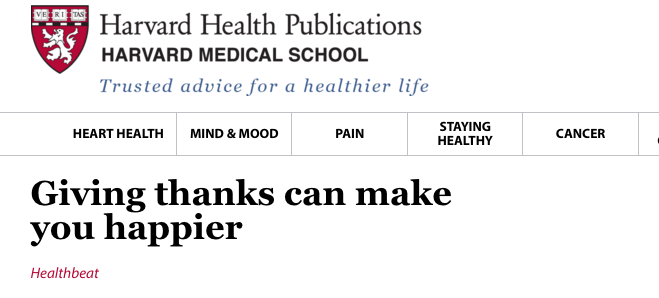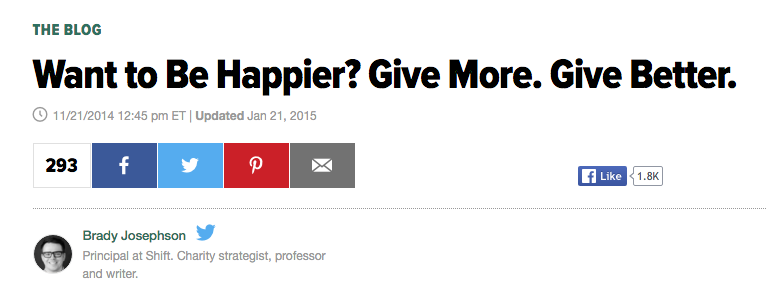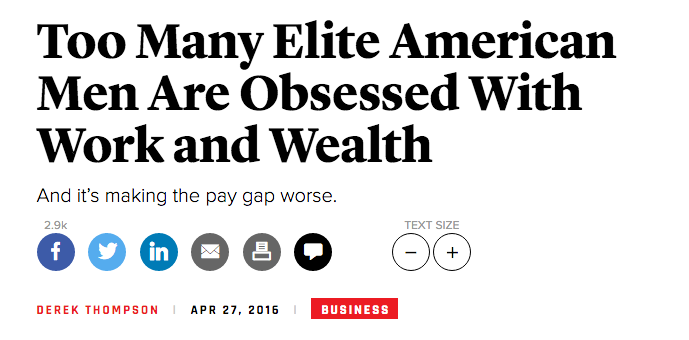As you graduate college, either begrudgingly or with enthusiasm, you will inevitably hear about or face the challenges of a work-life balance. It is certainly a challenge to find the right balance and will require that you make intentional decisions all along the way. I want to suggest three other continuums that you will need to balance and will require your intentional decision making and your frequent reflection. Maintaining a balance, I believe, will not only help you create a joyful and happy life, but also to contribute positively to a humanity that is facing a number of very dire social problems, climate change and ever expanding income inequality among the most pressing. The first of the continuums is confidence and humility.
Balance confidence and humility: As graduating seniors, it is likely that during the last year you have made a mental note, if not commented out loud, about how young and naive the freshman look and act. You have noticed and pointed out to anyone who will listen how much smarter you are as a senior, throwing out some quotes by your favorite theorist or slipping an abstract scientific principle you have learned into casual conversation. You should in fact commend yourself for all you have learned. You should feel more confident about who you are and what you know. You have likely developed new aspects to your identity and discovered new things about yourself as a person. You probably consider yourself more of an adult than when you were a freshman.
You have faced innumerable challenges inside the classroom – extensive research papers, challenging exams, and nerve-racking presentations to your peers – and outside the classroom – holding a job to help pay for school, cultural shock during (and returning from) study abroad semesters, family emergencies, personal illness, relationships breaking up, and more. Overcoming those challenges should have instilled confidence in you to face the challenges that are now before you. Many of those are unknown. You should now be more confident in your writing and speaking skills, your analytic skills, and your leadership abilities. This is good. Our mission was not to bludgeon your confidence with unattainable reading loads and incomprehensible expectations. Earning a college degree means that you have more education than most Americans and certainly more than most people around the world. You should be confident that your diploma is worth it, that it has given you knowledge that helps you to better understand the world, the tools to find a place in our society, to make better decisions, and to earn a more secure income. You are smarter, you have more skills, you have succeeded in accomplishing something great. You deserve to be confident.
Do not be so humble that it holds you back from contributing positively to society. Recognize your abilities, believe in them and be comfortable letting people know that you are the right person for the task. Being so humble that you always step back instead of stepping up will rob society of all that you have to offer.
But, while you are leaving here with confidence, you should balance that on a continuum with humility. You are fortunate to have had the opportunity to go to college. You should be grateful for the help you had along the way from friends, family, staff and professors. You should maintain humility because you have much more to learn and there are many people out there who can still teach you a great deal. Your education does not end today. It may not continue in a formal classroom setting, but it will continue.
You may be confident that you will come up with a solution to any number of social problems or create an innovative new product that contributes positively to society. Maintain enough humility to remember there are people who have been working creatively and with unrelenting passion on those problems and ideas for decades. Learn from them. Society needs your creativity and passion, but don’t be so confident that you fail to learn from others. If you are too confident, you will close yourself off from learning new things and seeing different perspectives. You were not always right during your time as a student and will not always be right in the future. If you are so confident that you think you know the one and only answer, you will miss opportunities to grow and learn. Hopefully, growth and learning experiences over the last four years have brought you excitement and a sense of wonder. Humility will help you continue those discoveries. Also, education does not give you more rights than every other citizen in our imperfect democracy. Too much confidence will prevent you from being a good citizen and beneficial member of society.
Balance being content with setting big goals: The second balancing game that I propose will serve you well in life is balancing being content and setting big goals. Scientists now know that one of the keys to happiness is being grateful. In other words, count your blessings. Be grateful for what you have, both materially and the opportunities you have been given. Acknowledge your success and find satisfaction in the abundance you already have. Over the next several weeks, many commencement speakers around the country will tell their audience to “shoot for the moon” or “work towards accomplishing a new high in our society.” While these speeches are often accompanied with grand tales of how they achieved their “greatness”, high goals and big dreams need to be balanced with finding happiness. Do you need to be the most famous person in your field? Do you need to make the most money? Do you need to work at the top firm or can you be content working at a good firm, making a good living and receiving some acknowledgement from your peers and family? Do you need to run the largest environmental organization in the country or can you be happy running a local organization that makes a positive impact in your community? If you push yourself too hard and set virtually unattainable goals you are likely to spend your life unhappy that you didn’t became a millionaire before you were thirty, didn’t invent the next iGadget, or get five million hits on YouTube that lead to a book and television deal. Without this balance you may end up feeling like you failed when in fact, a shift in your perspective will show that you have succeeded a great deal and that many people would be more than happy to be in your position.
Am I saying settle for less in your life? No. But too often the standards we set prevent us from being truly happy. We often only compare ourselves to those “above” us… “I’m not as rich as the person with the even bigger house.” “I’m not getting national recognition for my talents.” “I only have a BA.” “I’ve only traveled to Europe.” Don’t feel pressure to do more, attain more, and earn more if it does not make you happy. Set goals for yourself but be sure to also be grateful for what you have. Recently, thanks to social media, the phrase, “first world problems”, has emerged to remind us that we need to keep some perspective. Much of the world lives in poverty. Much of the world can only dream of having access to what we do. I recently began some new research in a rural area of Kenya. During exploratory interviews, nobody reported having ever been on the Internet. Ever! In the meantime, with the saturation of social media in our society, we can spend hours a day comparing ourselves to others, becoming miserable because we have not achieved everything!
Too often we seem to be in a constant state of achievement, failing to reflect on our accomplishments and finding contentment and happiness in them. This is one of the hardest continuums to balance because I am not arguing that we all become passive observers or sell our potential short. Nor should we become complacent with the state of society and the planet today (both desperately need our positive contribution). Rather, you should hone the skill of gratitude and be sure not to miss out on being joyful because you are always seeking bigger, better, faster, more.
Taking care of yourself and helping others: The final continuum that I have found requires frequent reflection in order to find the right balance is that of taking care of yourself and helping others. The extremes of both ends of this spectrum are bad places to be. If you do not take care of yourself, your contribution to society will not be sustainable. You will be more susceptible to burnout and likely develop a thick cynicism. You are not alone in your efforts, leave time for yourself to stay healthy (both mentally and physically), maintain friendships, and step away from time to time from whatever it is that is driving you – whatever it is will get along without you for a while.
But, don’t become so self-centered or hedonistic that you fail to help others. You have skills and talent, you have an education, you have the ability and responsibility to make life better for others. Plus, you will find great happiness in helping others. Others will find greater happiness with your help. Helping others does not have to mean that you alone are responsible for ending world hunger. You will have opportunities every day to make someone’s else’s life better. Be kind. Sacrifice some of your time and money so that others suffer less. This can be in your family, your neighborhood, your city or half way across the world. You don’t have to do everything, but you should do something.
Tutor at a neighborhood school. Participate in a protest to encourage our politicians to effectively and rapidly address climate change. Donate money or in-kind supplies to a domestic violence shelter, a homeless shelter, and an orphanage. Swing a hammer for Habit for Humanity helping someone own a home. Be a Big Brother or Big Sister. Volunteer in an impoverished community overseas for a year or two helping small businesses get micro-loans. The list is long.
In my lifetime I have found the greatest happiness in funding the education of a young man in Kenya to attend medical school in order to become a doctor and serve his own community, using my skills as a photographer to create a book (sold as a fundraising tool) documenting the work of young Kenyans in the slums of Nairobi, sharing my financial resources with Greenpeace, 350.org, and Friends of the Earth to help foster a more sustainable world for all species, using my research skills to help develop community health surveys for a grassroots organization in Western Kenya, training preschool teachers and teaching adult literacy in Mozambique, and giving money to Oxfam and others to alleviate hunger and poverty. Some of these acts took minutes while others involved years. Of course you will find your own avenues to helping others; the point is, if you want to be happy, look beyond yourself and your own comforts in order to share some of your skills and resources to help others. One of the most ancient lessons of humanity seems to be that collecting material goods and amassing wealth brings you immediate, but quickly fleeting happiness. Instead, much of history’s greatest thinkers argue that you will find deep and lasting happiness in helping others.
So, what is the right balance within these continuums? That is a good question and it is one you will have to answer for yourself now and reflect on often in the future. Good luck and I hope you find happiness!
. . .
Click on the images below to be directed to the link for more reading:
Research on how giving can make you a happier person:
A great web site to find volunteer opportunities:
A story on how giving does make you happier:
Some speculation on why Millennials are unhappy:
How overwork makes you unhappy:






Comments